 |
| She's the one: Even in the case of
products that women don't consume, they are often the key
decision-makers |
Tom peters isn't
so much a management thinker as an evangelist. He wants to convert
people. Convert to his version of management, which is largely
Me Inc. So, what does the former McKinsey consultant, who shot
to fame in the early 80s with his In Search of Excellence, have
to offer in this collection of four coat pocket-sized Essentials?
If you've read some of his previous books like The Circle of Innovation,
or Re-Imagine!, you don't need to bother with this quartet, because
it is an adaptation of the latter book, which, in turn, was an
extension of the former.
But if you haven't dug into Peters in any
significant way, this combo pack is highly recommended. It has
everything that Peters the management writer has come to be associated
with: exclamation marks, colourful and innovative page design
(a thing he took to after he shifted from Knopf to the current
publisher), and an almost-garrulous and rambling style of writing.
Each of the four booklets has a specific theme: Design (product
and service), leadership, talent, and trends (essentially about
women as the prime consumers). In the introduction, Peters explains
what prompted him to come out with this abridged set. It was,
in effect, a bid to help the reader reinvent herself in an age
when outsourcing and New Economy's relentless march threatened
to make her skills obsolete. "Summer 2005. I publish a series
of four quick and to-the-point books... the Essentials. As in:
Here are the essential things you must know... as you strive to
act... in this unstable, up-tempo, outsourcing-addled, out-of-this-world
age".
It's difficult, if not impossible, to take
up all the four booklets in this short space, so let's look at
what Peters has to say about leadership and women as consumers.
First, leadership. If people tell you, Peters says, that the job
of a leader is to transform, they are wrong. The leader's job
is to "construct a context in which... Voyages of Mutual
Discovery... can take place". Continuing with the same rant,
he tells you 49 other things that leaders are supposed or not
supposed to be. Another gem: Leaders are rarely the best performers.
More: Leaders hang out with freaks. Good stuff, but not great.
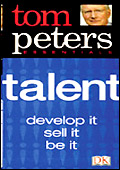 |
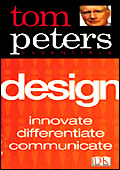 |
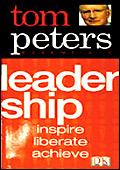 |
 |
| TOM PETERS
ESSENTIALS Dorling Kindersley, PP: 160, Price: Rs 307 |
Of the four, the booklet that marketers may
want to pay the most heed to is the one on trends, co-authored
with Martha Barletta, an expert on marketing to women and President/CEO
of The TrendSight Group. Barletta's basic argument: Men and women
are different; not better or worse, but just different. So the
thing for the marketer to do would be to launch products and services
designed especially for women, right? Wrong, says Barletta. "Don't
do it. Don't paint the brand pink," is her advice. "For
one thing," she explains, "women don't usually want
different features from those that men want. For another thing,
women will run away from a 'women's brand' just as fast as men."
The reason, she points out, is that women look upon women's products
as just a dumbed-down, but more expensive, version. "That's
condescending. It's alienating," she writes.
No doubt, there are occasions when Peters
goes overboard, but mostly he does a great job of goading you,
the reader, into action. It's almost as if he's taunting you;
change or roll over and play dead, he seems to be telling you.
If you've been looking for a personal, portable guru, this pocket-sized
Peters may just be it.
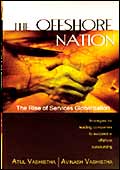 |
THE OFFSHORE NATION
By Atul Vashistha and Avinash Vashistha
Tata McGraw-Hill
PP: 296
Price: Rs 750 |
History will remember
the Offshore Nation (The Rise of Services Globalization reads
the sub-title) as the first authoritative book (there have been
others, but the less said about them, the better) targeted at
companies seeking to offshore all or some of their processes in
an effort to cut costs, improve quality and productivity, increase
efficiencies, or achieve a combination of these objectives. From
a purely marketing point of view, this book has a ready market.
Offshoring is no longer the preserve of Fortune 100, even Fortune
500 corporations; it has emerged one of the things even mid-sized
companies need to do to survive and thrive in the hyper-competitive
2000s. Atul and Avinash Vashista have the credentials to author
a tome such as this; the second is the founder of neoIT, a consulting
firm that sees itself as an offshore (rather offshoring) advisory;
the first is its CEO. And rather than simply being a collation
of case studies of companies that have successfully offshored
work, The Offshore Nation serves as a how-to book of sorts, listing
out, in great detail, the various processes a company would do
well to go through before and as it offshores work. In the process,
the writing sometimes lapses into dense and academic stuff of
the kind that would fit better into a reference manual. Then,
offshoring is serious business and this is a reference manual.
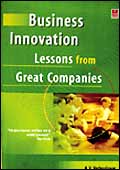 |
BUSINESS INNOVATION: LESSONS FROM GREAT
COMPANIES
By A.V. Vedpuriswar
Vision Books
PP: 488
Price: Rs 595 |
What makes great
companies tick? The answer, if one were to analyse, would probably
be that there is one thing that they do better than their competitors:
they innovate. That's not just in terms of new products, but processes
and entire business models. Toyota Motor employed lean manufacturing
to astounding effect; Dell used direct selling and build-to-order
techniques to stay #1 and, more importantly, profitable in a notoriously
low-margin business; and Herb Kelleher's low-cost Southwest Airlines
adopted a model so radically different that no other airline in
the US has been able to replicate it successfully.
In Business Innovation, Vedpuriswar, Dean
at the ICFAI Knowledge Centre in Hyderabad, makes a case for "business
model innovaton", as against incremental innovations in processes
or products. Most of what the author writes can be easily found
in the text books that a typical MBA course prescribes, and five
of the six case studies that he offers towards the end of the
book are also well known. The only one that hasn't been studied
in any depth, and interesting for that reason, is HDFC. Did you
know, for instance, that HDFC has a "no-star" policy
that creates a workplace of equals, or that it has a "no-firing"
policy except where fraud or deception is involved?
The author, given the constraints of producing
such a book from India, rehashes a whole lot of publicly available
information, but then India Inc. would do well to listen to his
key message, which is to focus on business model innovation. Because
that's how "a company changes the rules of the game and begins
to control the key levers of business".
|










